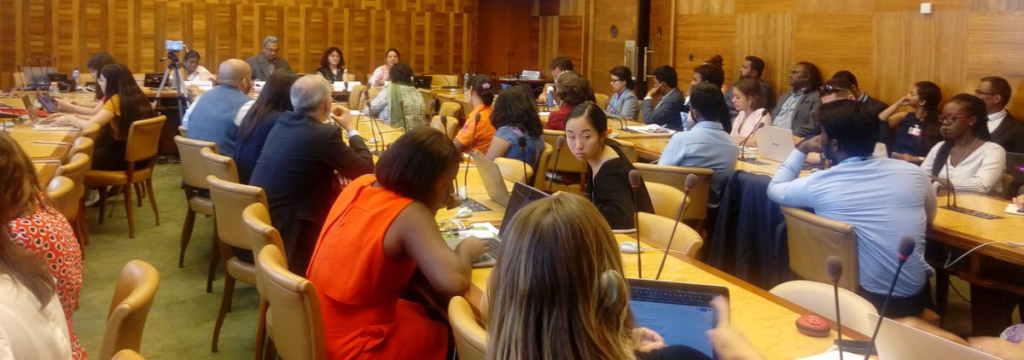Dalit human rights defenders and UN experts raise concerns over intersectional caste and gender discrimination and its adverse impact on access to human rights, at the Dalit Women and Gender Justice side-event at the UN Human Rights Council’s 41st Session in Geneva.
On 25 June 2019, IDSN International Associate IMADR, and others organised a side-event during the 41st Session of the Human Rights Council, on Dalit women and gender justice. The panel was composed of Dubravka Simonovic, the UN Special Rapporteur on Violence against Women, Renu Sijapati, General Secretary of the Feminist Dalit Organization (FEDO-Nepal) and Abirami Jotheeswaran, from the National Dalit Movement for Justice-National Campaign on Dalit Human Rights (NDMJ-NCDHR). The event was moderated by Henri Tiphagne, from Peoples’ Watch, in India.
Watch the full video stream of the HRC41 side-event on Dalit Women and Gender Justice:
Live now! Side Event #HRC41 : “Dalit Women and Gender Justice” at the UN Geneva Tuesday 25 June 2019, 2.30-3.30 pmPalais des Nations, Room IXPanel:- Henri Tiphagne: Indian lawyer, Human rights defender who created the NGO "People's Watch"- Dubravka Simonovic: UN Special Rapporteur on violence against women, its causes and consequences- Renu Sijapati: General Secretary, Feminist Dalit Organization Nepal- Abirami Jotheeswaran: National Program Coordinator, National Dalit Movement for Justice – NCDHREvent organized by @International Movement Against All Forms of Discrimination and Racism (IMADR) Co-sponsored by: Minority Rights Group International, Human Rights Watch, Anti-Slavery International, The Lutheran World Federation, Civicus, Geneva, Franciscans InternationalSupported by: International Dalit Solidarity Network (IDSN)Livestreamed by Red Internacional de Derechos Humanos
Posted by Red Internacional de Derechos Humanos on Tuesday, June 25, 2019
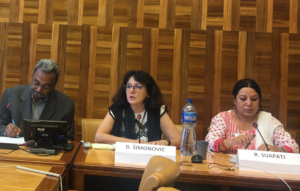
“In Nepal there is good constitutional language on violence against women but on the other hand there is a huge implementation gap, we must focus on implementation and see how to look into concrete cases and look at how these can be addressed by my mandate and other UN mechanisms,” The UN expert said, “My suggestion for everyone trying to work to end caste and gender discrimination is to use all the UN mechanisms available to submit cases and concrete examples to.”
Ms. Simonovic also encouraged the establishment of a National Action Plan for violence against Dalit women.
“I am advocating for a specific National Action Plan to address violence against Dalit Women, and it is now important to raise those recommendations with the Government and national actors, to see how this can be implemented. I hope my recommendations will be used at the national level by the Government, NGOs, Human Rights institutions and the many UN agencies working in Nepal.”
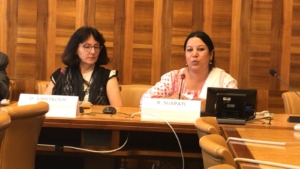
In Nepal, out of the total number of women raped, 20% are Dalits. Moreover, 80% of Dalit women and girls are killed after being raped. She called for increased action to address the extreme intersectional discrimination faced by Dalit women in Nepal who face abuse and violence at all levels of society and are not given access to justice or Government mechanisms.
Ms. Sijapati told the audience that prejudice and violence against Dalit women is particularly persistent within their own communities. Increased migration of Dalit women who flee their hometowns, due to oppression and lack of opportunities, aggravate their situation in large cities, in view of their lack of skills for decent work opportunities.
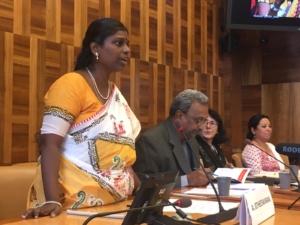
Similar to the situation in Nepal, 25% of women abused are Dalits and this figure keeps increasing. The Dalit community has been presenting information on these violations for the past 20 years to the international fora, like the UN, said Ms. Jotheeswaran stressing that,
“Eliminating caste-based discrimination is not just the responsibility of Dalits but the responsibility of all people globally, Dalit rights are human rights.”
Ms. Jotheeswaran explained that Dalit rights defenders are asking international bodies to extend solidarity to ensure that international mechanisms are pushing for the elimination of caste-based discrimination.
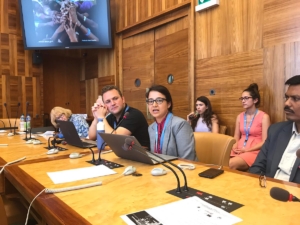
Beena Pallical, General Secretary of the National Campaign on Dalit Human Rights (NCDHR-India), added reflections about other forms of violence against Dalit women from the floor, such as limited access to public water and sanitation. Women from Dalit communities that are engaged in manual scavenging often face the brunt of discrimination, Ms. Pallical said. Moreover, affirmative action for government positions is overrepresented at the local levels and underrepresented at regional and national levels. Ms. Pallical argued for the need to continue to build assets for Dalit women, ownership of property, land in name of women, policies on discrimination and to ensure that women are part of decision making at all levels.
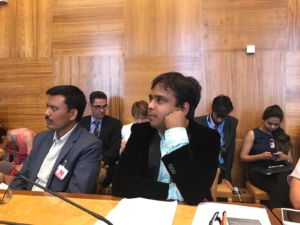
The side-event was organised by the International Movement Against All Forms of Discrimination and Racism (IMADR) and co-sponsored by Minority Rights Group International, Human Rights Watch, Anti-Slavery International, Lutheran World Federation, CIVICUS: World Alliance for Citizen Participation and Franciscans International.
The event was live-streamed by the human rights organisation RIDH with over 900 views and had very good attendance. Significant social media activity surrounded the event, including on Twitter and Facebook. The panelists subsequently also took part in meetings and dialogues at the Human Rights Council and an interview with Abirami Jotheeswaran was published by the site Feminism in India.
See some of the tweets from the event here:
3 minutes till the #HRC41 #NoCasteLeftBehind #CasteGenderJustice side-event kicks off in Geneva. Follow the live-stream at 14:30 CET on https://t.co/i0gieebOSW and tweet & share the statements from Dalit women and UN representatives on this crucial topic. #EndCasteDiscrimination https://t.co/e4rgtDJ0tk
— IDSN (@idsnupdates) June 25, 2019
Huge implementation gaps are highlighted by UN SR on VAW @DubravkaSRVAW as a key challenge to #CasteGenderJustice and the UN mechanisms must be used to make sure there is #NoCasteLeftBehind and we need specific national action plans to end violence against Dalit women from states pic.twitter.com/6MuUB6FeYm
— IDSN (@idsnupdates) June 25, 2019
Renu Sijapati from @FEDO speaking on the multiple marginaliaations being faced by Dalit women @HRC41 @idsnupdates @paulncdhr @rnathanva @ajaydalit @Tiphagne pic.twitter.com/ggMKyNRmIx
— NCDHR (@DalitRights) June 25, 2019
Renu Sijapati from @fedonepal calls for increased action to address extreme multiple discrimination faced by Dalit women in Nepal who face abuse and violence at all levels in society & are not given access to justice or Govt. mechanisms. #NoCasteLeftBehind #CasteGenderJustice
— IDSN (@idsnupdates) June 25, 2019
Abirami Jotheeswaran from @dalitrights speaks about the lack of implementation of legal protective measures meant to stop rape and violence against Dalit women in India at the #NoCasteLeftBehind #CasteGenderJustice UN #HRC41 side-event asking for action for change pic.twitter.com/XK5fXRzhnu
— IDSN (@idsnupdates) June 25, 2019
Unsafe migrations due to poverty and most of them are from the Dalit community! They are most vulnerable to several factors of violence and lack of access @idsnupdates @Tiphagne @paulncdhr @rnathanva @dalitwomenfight
— NCDHR (@DalitRights) June 25, 2019
Spl rapporteur on violence against girls says” use the Cedaw and other mechanisms extensively “ @idsnupdates @dalitwomenfight pic.twitter.com/JQpmrQZT2J
— NCDHR (@DalitRights) June 25, 2019
"Eliminating caste-based discrimination is not just the responsibility of Dalits but the responsibility of all people globally” We are asking International bodies to extent solidarity to ensure that international mechanisms are pushing for #CasteGenderJustice #NoCasteLeftBehind. https://t.co/FfSmSk4XFD
— IDSN (@idsnupdates) June 25, 2019
“There have been absolute limited services for Dalit women to water and sanitation and the women from these communities engaged in manual scavenging have no protection and face the brunt of caste discrimination – with no options to exercise their power says @sitara1 from floor.
— IDSN (@idsnupdates) June 25, 2019
The need for specific budget allocations for Dalit women and the implementation for these policies must be made a priority as does advancing the political participation of Dalit women says @sitara1 from @DalitRights at the #NoCasteLeftBehind #CasteGenderJustice event
— IDSN (@idsnupdates) June 25, 2019
“Dalit women are agents of change and we must stand in solidarity with them” says Moderator @Tiphagne at the #NoCasteLeftBehind #CasteGenderJustice UN #HRC41 side-event pic.twitter.com/3jGjTNttWH
— IDSN (@idsnupdates) June 25, 2019
The Second Secretary of the Mission of Nepal says she is very proud of Nepal’s civil society and is committed to working to end caste- and gender discrimination and use all UN mechanisms available to further this goal- speaking at the UN #HRC41 #NoCasteLeftBehind event @MofaNepal pic.twitter.com/PtQKShBe8D
— IDSN (@idsnupdates) June 25, 2019
Effective implementation of all the progressive legislation like bonded labour, Prewventuon of Atrocities act & appeal to all international agencies to ensure recommendations to address violence against Dalit women @idsnupdates @Tiphagne pic.twitter.com/uCDEzmFGgX
— NCDHR (@DalitRights) June 25, 2019
Laws are not sufficient in the case of caste and gender based violence, the laws need to be integrated with social services, education, prevention, & addressing & we must see implementation thoughout the justice system –@DubravkaSRVAW at the #HRC41 #CasteGenderJustice side-event pic.twitter.com/m80ZdkE7Ve
— IDSN (@idsnupdates) June 25, 2019
Thank you to @IMADR_Geneva @hrw @MinorityRights @Anti_Slavery @CIVICUSalliance @lutheranworld @FranciscansIntl for making this important #NoCasteLeftBehind #CasteGenderJustice #HRC41 event happen & to speakers for sharing wisdom and participants for listening and taking action pic.twitter.com/xPsaRjcBgc
— IDSN (@idsnupdates) June 25, 2019
Shared the stories of #Dalitwomen of Deccan Development Society 🇮🇳 on winning the coveted #UN #award the #EquatorPrize at #UNHRC19 in #Geneva for outstanding e.g. of local #Nature based solution to #climatechange & #sustainabledevelopment ✊✊🍀 @jamisonervin @idsnupdates @UNDP pic.twitter.com/dUwdaMkNBw
— Ritwajit (@Ritwajit) June 25, 2019
Excellent intervention from @Ritwajit to highlight what #Dalit women can achieve as equator prize winners have shown pic.twitter.com/gmwlZo1G6L
— IDSN (@idsnupdates) June 25, 2019
With @dalitwomenfight colleagues from @DalitRights and @FEDONepal in @unhrcpr session to #eliminate #discrimination #violence against women and girls by 2030 with @DubravkaSRVAW pic.twitter.com/ycwFULWMEB
— IDSN (@idsnupdates) June 26, 2019
Don’t miss this interview on caste, violence and human rights with Human Rights activist Abirami Jotheeswaran of @dalitrightshttps://t.co/SpVopj3FKc you can also see Abirami on the panel of the #NoCasteLeftBehind #CasteGenderJustice side-event here https://t.co/fO4eEUGprM pic.twitter.com/zE8xNv0r81
— IDSN (@idsnupdates) July 1, 2019

